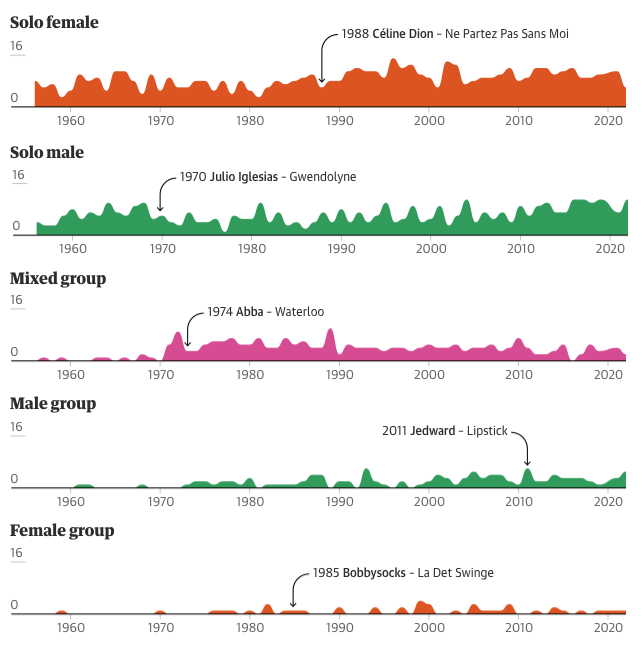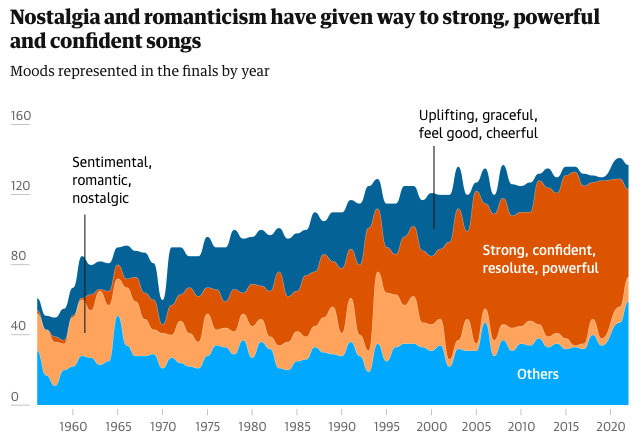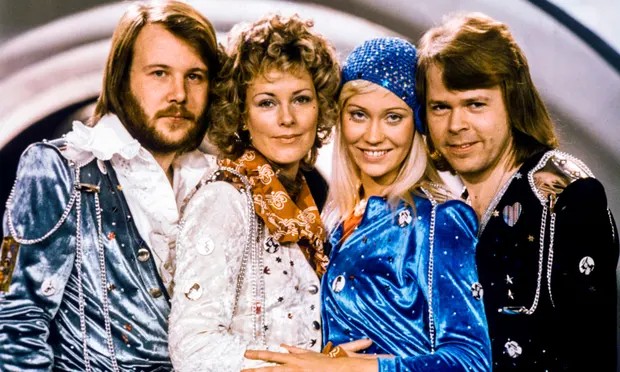Having crunched data from all 1,371 Eurovision finalists since it began in 1956, we’ve worked out the type of song and artist with the best chance of scoring douze points
Grab a miniature flag, slap on a grin and prepare yourself for pre-written, faltering gags from the hosts falling on the deaf ears of a rambunctious audience … yes, Eurovision is upon us.
Whether you’re allured by the kitsch – or watch it under duress – at least one song each year will spark the thought: “Even I could write something better than this!”
Well, dear Eurovision lovers/sceptics, we are here to help guide you through the process. We have analysed all 1,371 Eurovision finalists over almost seven decades, poring over the ingredients of the winning, second- and third-place entries, for genres, gender, groupings and mood, to come up with the perfect Eurovision song recipe.
Make it pop!
Delve into the Eurovision archives and you will find a plethora of genres, many of them distinct to the country they represent: take the copla songs entered by Spain in 1965 and 1982; Norway’s traditional joik chorus, used in 1980, or the Celtic sounds behind Ireland’s 2007 song.
Before the 1970s, 85% of the entries which placed first, second or third in the competition were not pop songs (meaning the song had two or more other genres which were more prominent). Indeed, big-band swing-style sounds, and French chanson, were the dominant species until the early 1970s, when pop and rock began their stellar rise in the competition, according to data provided by Cyanite, a company that uses AI to analyse and classify music.
Now, pop is virtually the only pathway to the confetti-strewn podium. Our analysis shows that just five non-pop songs have placed within the top three since 2000.https://interactive.guim.co.uk/uploader/embed/2023/05/genre-zip/giv-13425ewSOFv0QrGaa/
Finland won with Lordi’s memorable heavy metal entry in 2006 while, in stark contrast, Salvador Sobral’s jazz waltz topped the competition for Portugal in 2017. Italy took top billing in 2021 with Måneskin’s rock performance, 10 years after the Italian Raphael Gualazzi finished second with a jazz entry. Russia placed third in 2019 with Sergey Lazarev’s psychedelic rock.

Minor miracle?
There is a good chance that, if you’re of a certain Eurovision vintage, you associate the competition with high-energy, up-tempo songs, and with good reason: four out of five songs in the top three places over the life of the competition had high or medium energy, those tending towards “stomping” or “bouncy” rhythm, rather than lower-energy songs with a more “flowing” pace.
Meanwhile, two-thirds of entries are written in more cheerful major keys, but this is changing. Songs in minor keys are on the up and have taken a prominent place since 2000, with two-thirds of the entries securing a top-three spot now sung in a minor scale.

It’s time for your solo
Yes, the past two winners – Ukraine’s Kalush Orchestra and Italy’s Måneskin – were bands. And yes, Abba are indisputably the most identifiable Eurovision winner of all time (sorry Lordi). But according to the data, if you want to win the competition in the modern era, you are more likely to do so as a solo artist.
It wasn’t always so. In its very early incarnation, the song contest was dominated by solo singers punctuated by the odd duet, averaging at less than one band per year – but by 1971 a quarter of the entries were bands, jumping to half of competitors a year later, according to the Eurovision database Six on Stage.
When Abba won the competition in 1974 with Waterloo, only the second band ever to do so after Grethe & Jørgen Ingmann for Denmark in 1963, it was the start of a golden era for groups, who gathered two in five of the Eurovision gongs in the 1970s and 80s, including two UK entries: Save Your Kisses for Me by Brotherhood of Man in 1976 and Making Your Mind Up by Bucks Fizz in 1981.
But solo artists have made their voice heard again in the past two decades, taking the top three positions in more than two-thirds of the competitions held since 1990.
Solo female artists dominate the song contest. More than 42% of finalist performances since 1956 are solo women, compared to 30% solo male performers, although the number of men performing solo or in bands has increased since the 1990s.
The higher participation of solo female artists might explain why they have got more of the top positions. Since 1957, almost half of the top-three spots have been taken by female solo artists, followed by groups (28%, both mixed or single gender) and male solo artists (23%).
While women dominate on the stage, men have a higher presence in the Eurovision’s famous green room: more than four out of five of the composers/lyricists are men. And while there has been an improvement in women’s representation in recent decades – before 1980, only 5% of composers and lyricists were women – they still make up only 20%.
You’ve lost that loving feeling
There are no prizes for guessing that the most-used lyric (other than so-called stop words like the, a, me, you etc) is “love” followed by – and the Eurovision haters will hate this one – “la la”.
But if this level of cheese is making your stomach turn, there is good news for aspiring Eurovision lyricists. The inclusion of “love” fell from a whopping 80% of songs in the 1950s to less than half of entries since 2000.
There has been a corresponding change in mood: the sentimental, nostalgic and romantic songs of the earlier decades have given way to feelgood music in the 1970s and 1980s. Come the 1990s, the Eurovision stage has seen a host of songs designed to evoke power, confidence and strength in their listeners, such as the UK’s own Sam Ryder who came second with Space Man in 2022; Måneskin’s Zitti e Buoni, the 2021 winner in 2021 or the 2018 winner Netta Barzilai.https://interactive.guim.co.uk/uploader/embed/2023/05/mood-zip/giv-13425xjGEzZwJVssU/
English language songs have taken a very prominent role in the Eurovision contest since the rule of singing in an entry’s national language, introduced in 1977, was removed in 1999.
Three quarters of entries featured (at least some) English lyrics since the millennium. English has been another common factor in the podium, with more than eight in 10 of the top three songs being delivered in English.
So, what is the ultimate Eurovision song?
Time for the Guardian delegation to award our douze points. So, our aspiring songwriters – we’ve whittled down almost 1,400 entries to bring you the song that we think you might best model yours on. And with its English lyrics, pop genre, energetic tempo, solo female performer, both major and minor chords, and its lyrics about both love and supernatural power, the winner is … (very long pause) … the 2012 Swedish entry and contest winner, Euphoria by Loreen! Who, incidentally, is the favourite to win this year, too. Enjoy!
Source: The Guardian



Recent Comments